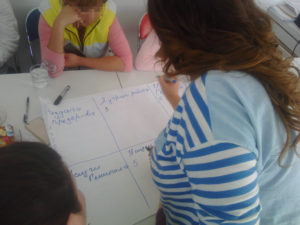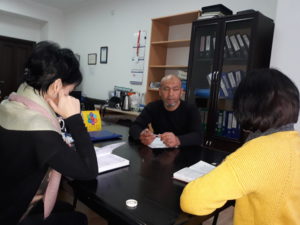
Author: Olga Ochneva, Kyrgyzstan
Sex workers over the age of 30 desperately need employment; women living with HIV have a need for women’s dormitories – these are the preliminary conclusions of two different studies conducted in Kyrgyzstan. The complete results of the needs’ assessment and HIV prevention programs in the country will be presented at the 22nd International AIDS Conference (AIDS 2018). The research is conducted by these communities for the first time. AFEW International provided this opportunity for key populations in Kyrgyzstan and other countries of East Europe and Central Asia (EECA) within the Small Grants Program.
New and unexpected discoveries
International AIDS Conference is a platform for the community to express their voices. Currently, community organizations from the EECA countries supported by AFEW International are carrying out the research, the results of which will be presented at the International AIDS Conference in July 2018 in Amsterdam. There are two research teams in Kyrgyzstan.
“Our organization has wanted to conduct a similar assessment for a long time. This is the first full-scale study among sex workers in the country,” Ulan Tursunbayev, the director of Ulukman Dariger NGO says. His organization assesses the effectiveness of HIV/AIDS prevention program with the help of the sex-workers themselves. “The preparation of the research and data collection took us four months. We traveled the country – four people, two of which being consultants. First, we tested our questions in mini sessions, so that they were clear to the community members and could open them up for the dialog.”
Another organization from Kyrgyzstan – PF Prosvet – conducts research work among women living with HIV. They study the impact of HIV-positive status on women’s lives.
“Community representatives are the main executors of the project,” Margarita Sabirova, a psychologist at Prosvet is saying. AFEW International has provided all training opportunities: trainings, online modules, technical expert support. Community education has become one of the most important and long-lasting pre-research phases. Nowadays, they possess new knowledge and skills, and we have honest and frank research data.”
Data mining has been conducted since April, and the final reports are being currently prepared. It has already become clear that the research contains new and unexpected discoveries.
“It was really interesting to see how the needs of sex workers differ before and after they turn 30,” Ulan Tusunbaev says. “They even sat apart from each other during the focus group meetings. Young women said they had enough condom supplies from prevention projects, outreach work and legal assistance. Older sex workers wanted to change the area of work and asked for the assistance with this.”
Many said that they rather would not provide sex services for the rest of their lives, and wanted to start building their future then.
“In course of my work, I was able to buy some land where I am starting to build a house, and where I will then open a store. I have already prepared the materials for construction,” says one of the interviewees of the research. “I hope this store will help me and my child when I will no longer do sex-work. Therefore, it is good to have some skills training programs available. After all, we have all been working here for 5-8 years and have no education. In order to engage in something different, we would need additional skills.”
The South and North have different needs

Employment is also one of the most important problems for women living with HIV. According to the representative of PF Prosvet, women say that many of them have no spouses and thus they need to take care about their own financial well-being. Some of them are the only ones who financially support their children. Employers often unreasonably demand HIV and medical examination and refuse employment.
“Thanks to the research, we are sure now that the services need to be divided according to the needs of a certain group,” Margarita Sabirova shares. “We have not only identified the priority needs, but also clearly noticed the difference in the set services needed in the North and South of the country. For instance, people in the South need social support, while people in the North of the country are more socialized clients who have different needs.”
The next phase in the Small Grant Program by AFEW International is the training on how to write abstracts (thesis) for organizations in preparation for AIDS 2018 and teaching them how to present their research results.
“The lack of gender approaches in the provision of services and the specifics of different areas of the country often limit access to the health care, legal, social, and psychological support. We hope that the presentation on the results of our study during AIDS2018 will encourage participants from other countries to pay attention to this problem in their own part of the country,” Margarita Sabirova is saying. “The research has identified a number of specific service needs for women, which are not met now either fully or partially. We hope that funds will be available to finance this unmet need. We have many recommendations in our report, and these will help to improve existing services. In any case, as an organization, in whom the community trusts, we should express community needs to the government, donor and non-governmental organizations.”



